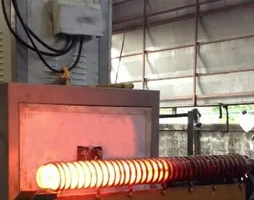- 27
- Jun
Almindelige fejl og fejlfindingsmetoder for højfrekvent bratkøleudstyr
Almindelige fejl og fejlfindingsmetoder vedr højfrekvent slukkeudstyr
1. Fault phenomenon The high-frequency quenching equipment is running normally, but the bypass reactor is heated and burned out.
The main reasons for the heating and burning of the bypass reactor are as follows:
(1) The quality of the bypass reactor itself is not good;
(2) There is asymmetric operation of the inverter circuit, and the main reason for the asymmetric operation of the inverter circuit comes from the signal loop.
2. Fault phenomenon The high-frequency quenching equipment operates normally and often breaks down the compensation capacitor. The cause of the fault:
(1) The intermediate frequency voltage and operating frequency are too high;
(2) The capacitor configuration is not enough;
(3) In the capacitor boost circuit, the capacity difference between the series capacitor and the parallel capacitor is too large, resulting in uneven voltage breakdown of the capacitor;
(4) Cooling is not good for breakdown capacitors.
3. Failure phenomenon The high-frequency quenching equipment operates normally but frequently overcurrent.
When the equipment is running, the waveform and sound of various electrical parameters are normal, that is, frequent overcurrent. When such a fault occurs, pay attention to whether it is due to improper wiring that generates electromagnetic interference and parasitic parameter coupling interference between lines, such as strong wires and weak wires. , the power frequency line and the intermediate frequency line are laid together, the signal line is intertwined with the strong wire, the intermediate frequency line busbar, etc.

